Jiajie Zhu
Macquarie University
Cross-Domain Fake News Detection on Unseen Domains via LLM-Based Domain-Aware User Modeling
Feb 02, 2026Abstract:Cross-domain fake news detection (CD-FND) transfers knowledge from a source domain to a target domain and is crucial for real-world fake news mitigation. This task becomes particularly important yet more challenging when the target domain is previously unseen (e.g., the COVID-19 outbreak or the Russia-Ukraine war). However, existing CD-FND methods overlook such scenarios and consequently suffer from the following two key limitations: (1) insufficient modeling of high-level semantics in news and user engagements; and (2) scarcity of labeled data in unseen domains. Targeting these limitations, we find that large language models (LLMs) offer strong potential for CD-FND on unseen domains, yet their effective use remains non-trivial. Nevertheless, two key challenges arise: (1) how to capture high-level semantics from both news content and user engagements using LLMs; and (2) how to make LLM-generated features more reliable and transferable for CD-FND on unseen domains. To tackle these challenges, we propose DAUD, a novel LLM-Based Domain-Aware framework for fake news detection on Unseen Domains. DAUD employs LLMs to extract high-level semantics from news content. It models users' single- and cross-domain engagements to generate domain-aware behavioral representations. In addition, DAUD captures the relations between original data-driven features and LLM-derived features of news, users, and user engagements. This allows it to extract more reliable domain-shared representations that improve knowledge transfer to unseen domains. Extensive experiments on real-world datasets demonstrate that DAUD outperforms state-of-the-art baselines in both general and unseen-domain CD-FND settings.
IO-RAE: Information-Obfuscation Reversible Adversarial Example for Audio Privacy Protection
Jan 03, 2026Abstract:The rapid advancements in artificial intelligence have significantly accelerated the adoption of speech recognition technology, leading to its widespread integration across various applications. However, this surge in usage also highlights a critical issue: audio data is highly vulnerable to unauthorized exposure and analysis, posing significant privacy risks for businesses and individuals. This paper introduces an Information-Obfuscation Reversible Adversarial Example (IO-RAE) framework, the pioneering method designed to safeguard audio privacy using reversible adversarial examples. IO-RAE leverages large language models to generate misleading yet contextually coherent content, effectively preventing unauthorized eavesdropping by humans and Automatic Speech Recognition (ASR) systems. Additionally, we propose the Cumulative Signal Attack technique, which mitigates high-frequency noise and enhances attack efficacy by targeting low-frequency signals. Our approach ensures the protection of audio data without degrading its quality or our ability. Experimental evaluations demonstrate the superiority of our method, achieving a targeted misguidance rate of 96.5% and a remarkable 100% untargeted misguidance rate in obfuscating target keywords across multiple ASR models, including a commercial black-box system from Google. Furthermore, the quality of the recovered audio, measured by the Perceptual Evaluation of Speech Quality score, reached 4.45, comparable to high-quality original recordings. Notably, the recovered audio processed by ASR systems exhibited an error rate of 0%, indicating nearly lossless recovery. These results highlight the practical applicability and effectiveness of our IO-RAE framework in protecting sensitive audio privacy.
Diagnostic-Guided Dynamic Profile Optimization for LLM-based User Simulators in Sequential Recommendation
Aug 18, 2025Abstract:Recent advances in large language models (LLMs) have enabled realistic user simulators for developing and evaluating recommender systems (RSs). However, existing LLM-based simulators for RSs face two major limitations: (1) static and single-step prompt-based inference that leads to inaccurate and incomplete user profile construction; (2) unrealistic and single-round recommendation-feedback interaction pattern that fails to capture real-world scenarios. To address these limitations, we propose DGDPO (Diagnostic-Guided Dynamic Profile Optimization), a novel framework that constructs user profile through a dynamic and iterative optimization process to enhance the simulation fidelity. Specifically, DGDPO incorporates two core modules within each optimization loop: firstly, a specialized LLM-based diagnostic module, calibrated through our novel training strategy, accurately identifies specific defects in the user profile. Subsequently, a generalized LLM-based treatment module analyzes the diagnosed defect and generates targeted suggestions to refine the profile. Furthermore, unlike existing LLM-based user simulators that are limited to single-round interactions, we are the first to integrate DGDPO with sequential recommenders, enabling a bidirectional evolution where user profiles and recommendation strategies adapt to each other over multi-round interactions. Extensive experiments conducted on three real-world datasets demonstrate the effectiveness of our proposed framework.
Causal-Invariant Cross-Domain Out-of-Distribution Recommendation
May 22, 2025Abstract:Cross-Domain Recommendation (CDR) aims to leverage knowledge from a relatively data-richer source domain to address the data sparsity problem in a relatively data-sparser target domain. While CDR methods need to address the distribution shifts between different domains, i.e., cross-domain distribution shifts (CDDS), they typically assume independent and identical distribution (IID) between training and testing data within the target domain. However, this IID assumption rarely holds in real-world scenarios due to single-domain distribution shift (SDDS). The above two co-existing distribution shifts lead to out-of-distribution (OOD) environments that hinder effective knowledge transfer and generalization, ultimately degrading recommendation performance in CDR. To address these co-existing distribution shifts, we propose a novel Causal-Invariant Cross-Domain Out-of-distribution Recommendation framework, called CICDOR. In CICDOR, we first learn dual-level causal structures to infer domain-specific and domain-shared causal-invariant user preferences for tackling both CDDS and SDDS under OOD environments in CDR. Then, we propose an LLM-guided confounder discovery module that seamlessly integrates LLMs with a conventional causal discovery method to extract observed confounders for effective deconfounding, thereby enabling accurate causal-invariant preference inference. Extensive experiments on two real-world datasets demonstrate the superior recommendation accuracy of CICDOR over state-of-the-art methods across various OOD scenarios.
Adaptive Graph Unlearning
May 19, 2025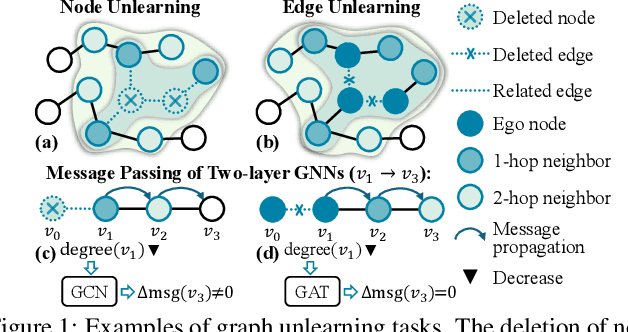
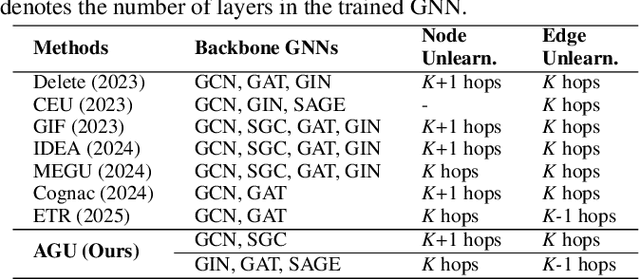
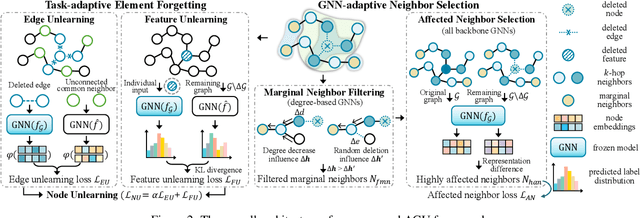
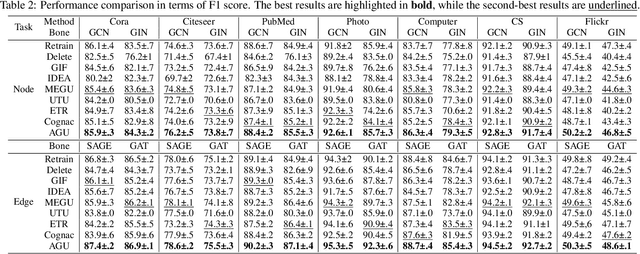
Abstract:Graph unlearning, which deletes graph elements such as nodes and edges from trained graph neural networks (GNNs), is crucial for real-world applications where graph data may contain outdated, inaccurate, or privacy-sensitive information. However, existing methods often suffer from (1) incomplete or over unlearning due to neglecting the distinct objectives of different unlearning tasks, and (2) inaccurate identification of neighbors affected by deleted elements across various GNN architectures. To address these limitations, we propose AGU, a novel Adaptive Graph Unlearning framework that flexibly adapts to diverse unlearning tasks and GNN architectures. AGU ensures the complete forgetting of deleted elements while preserving the integrity of the remaining graph. It also accurately identifies affected neighbors for each GNN architecture and prioritizes important ones to enhance unlearning performance. Extensive experiments on seven real-world graphs demonstrate that AGU outperforms existing methods in terms of effectiveness, efficiency, and unlearning capability.
DP-TRAE: A Dual-Phase Merging Transferable Reversible Adversarial Example for Image Privacy Protection
May 11, 2025Abstract:In the field of digital security, Reversible Adversarial Examples (RAE) combine adversarial attacks with reversible data hiding techniques to effectively protect sensitive data and prevent unauthorized analysis by malicious Deep Neural Networks (DNNs). However, existing RAE techniques primarily focus on white-box attacks, lacking a comprehensive evaluation of their effectiveness in black-box scenarios. This limitation impedes their broader deployment in complex, dynamic environments. Further more, traditional black-box attacks are often characterized by poor transferability and high query costs, significantly limiting their practical applicability. To address these challenges, we propose the Dual-Phase Merging Transferable Reversible Attack method, which generates highly transferable initial adversarial perturbations in a white-box model and employs a memory augmented black-box strategy to effectively mislead target mod els. Experimental results demonstrate the superiority of our approach, achieving a 99.0% attack success rate and 100% recovery rate in black-box scenarios, highlighting its robustness in privacy protection. Moreover, we successfully implemented a black-box attack on a commercial model, further substantiating the potential of this approach for practical use.
Causal Deconfounding via Confounder Disentanglement for Dual-Target Cross-Domain Recommendation
Apr 17, 2024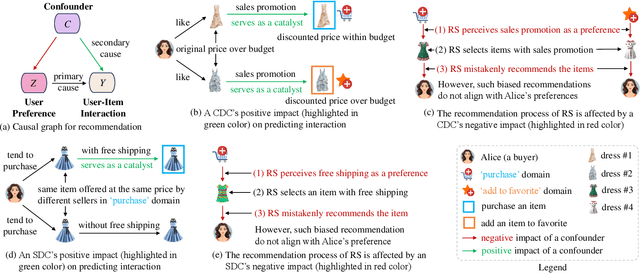
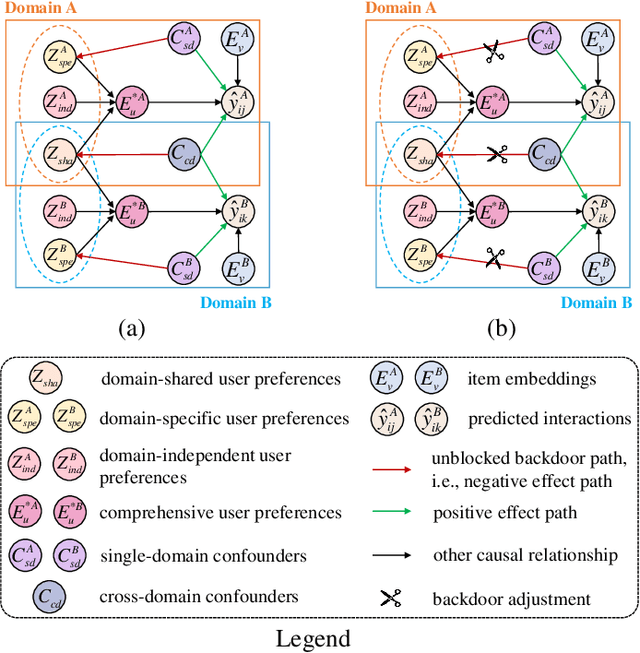
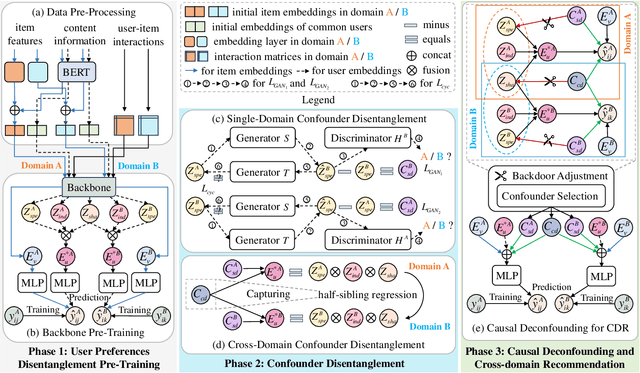
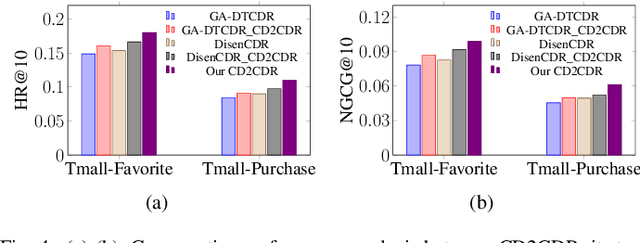
Abstract:In recent years, dual-target Cross-Domain Recommendation (CDR) has been proposed to capture comprehensive user preferences in order to ultimately enhance the recommendation accuracy in both data-richer and data-sparser domains simultaneously. However, in addition to users' true preferences, the user-item interactions might also be affected by confounders (e.g., free shipping, sales promotion). As a result, dual-target CDR has to meet two challenges: (1) how to effectively decouple observed confounders, including single-domain confounders and cross-domain confounders, and (2) how to preserve the positive effects of observed confounders on predicted interactions, while eliminating their negative effects on capturing comprehensive user preferences. To address the above two challenges, we propose a Causal Deconfounding framework via Confounder Disentanglement for dual-target Cross-Domain Recommendation, called CD2CDR. In CD2CDR, we first propose a confounder disentanglement module to effectively decouple observed single-domain and cross-domain confounders. We then propose a causal deconfounding module to preserve the positive effects of such observed confounders and eliminate their negative effects via backdoor adjustment, thereby enhancing the recommendation accuracy in each domain. Extensive experiments conducted on five real-world datasets demonstrate that CD2CDR significantly outperforms the state-of-the-art methods.
Domain Disentanglement with Interpolative Data Augmentation for Dual-Target Cross-Domain Recommendation
Jul 26, 2023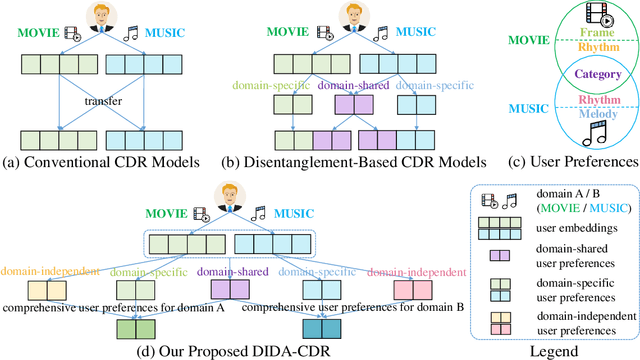
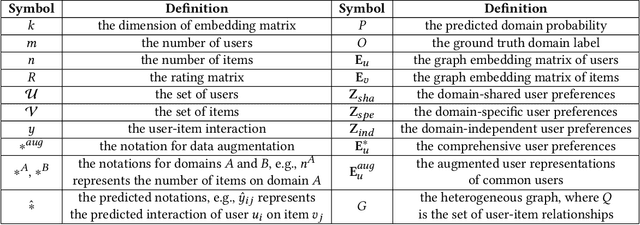
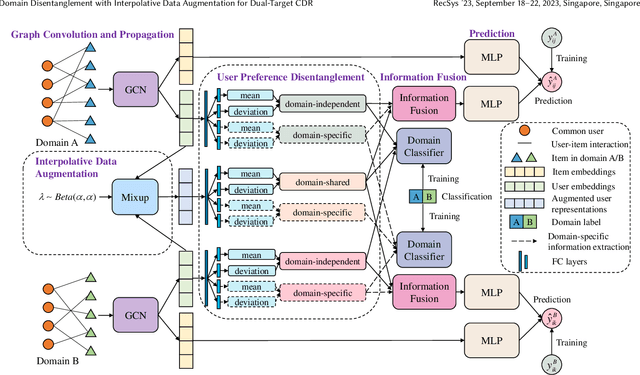

Abstract:The conventional single-target Cross-Domain Recommendation (CDR) aims to improve the recommendation performance on a sparser target domain by transferring the knowledge from a source domain that contains relatively richer information. By contrast, in recent years, dual-target CDR has been proposed to improve the recommendation performance on both domains simultaneously. However, to this end, there are two challenges in dual-target CDR: (1) how to generate both relevant and diverse augmented user representations, and (2) how to effectively decouple domain-independent information from domain-specific information, in addition to domain-shared information, to capture comprehensive user preferences. To address the above two challenges, we propose a Disentanglement-based framework with Interpolative Data Augmentation for dual-target Cross-Domain Recommendation, called DIDA-CDR. In DIDA-CDR, we first propose an interpolative data augmentation approach to generating both relevant and diverse augmented user representations to augment sparser domain and explore potential user preferences. We then propose a disentanglement module to effectively decouple domain-specific and domain-independent information to capture comprehensive user preferences. Both steps significantly contribute to capturing more comprehensive user preferences, thereby improving the recommendation performance on each domain. Extensive experiments conducted on five real-world datasets show the significant superiority of DIDA-CDR over the state-of-the-art methods.
 Add to Chrome
Add to Chrome Add to Firefox
Add to Firefox Add to Edge
Add to Edge